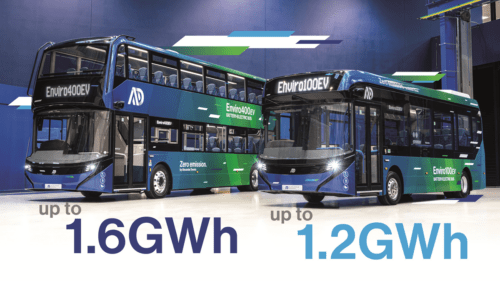
Alexander Dennis has announced that it, along with battery supply partner Impact Clean Power Technology, has increased the warrantable energy throughput of its next-generation electric buses. Its new Enviro100EV and Enviro400EV have been designed to have what Alexander Dennis calls a ‘future-proof battery system’ designed to maximise use before battery replacement becomes necessary.
Drawing on the versatility of NMC cell chemistry, the manufacturer has increased the longevity and value offered to operators of its next-generation electric buses. Alexander Dennis says that it has been able to improve the warrantable energy throughput to 1.6GWh over eight years for the Enviro400EV with 472kWh battery, or 1.2GWh with 354kWh battery.
On the Enviro100EV, an energy throughput of 1.2GWh can be warranted when the bus is fitted with the larger 354kWh battery system, or 800,000kWh for the 236kWh battery option.
Sales & Business Development Director, Ben Werth said: “The option to warrant higher-intensity battery use is great news for operators planning to deploy electric buses on heavy-duty or high-mileage services. We’re delighted to be driving value through longevity by giving our customers peace of mind that our next-generation electric buses will offer longer-term operational profitability.
“We have recognised with our customers that the energy throughput, including regeneration, is critical to calculating the true longevity of their battery capacity choice, and by using our industry-standard multi-physics simulation modelling, we can ensure we deliver the warranted battery performance that meets expectations.
“Route analysis shows that our batteries provide the available energy to cover two consecutive seven-year contract terms on typical Transport for London routes without a battery change, or typical provincial routes for up to 20 years with just one mid-life change of batteries.”

